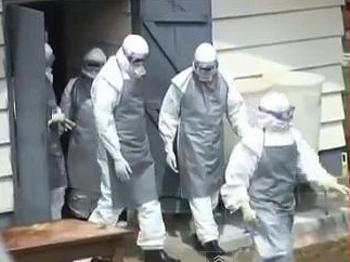
KAMPALA, Uganda, July 30, 2012 (ENS) – Uganda’s Ministry of Health is advising residents to avoid eating dead animals especially monkeys, after declaring an outbreak of the highly infectious Ebola virus that has killed 14 people.
Declared Saturday, the outbreak is centered in the Kibaale district in western Uganda. Nine of the 14 deaths occurred in a single household in Nyanswiga village. The deceased include a clinical officer who attended to a patient, and her four month-old child.

The Uganda Virus Research Institute in Entebbe confirms that the strange disease in the district was Ebola hemorrhagic fever virus, Sudan strain.
A report from the Kibaale district health authorities to the Ministry of Health on July 11 indicated that people had delayed seeking treatment partly because they believed that the cause of the illness was due to “evil spirits.” This caused civil strife among the community requiring police intervention to quell the animosity.
Today, the Ministry of Health and the World Health Organization announced that they have managed to contain the outbreak. Currently, two patients are hospitalized and are in stable condition. The first is a 38 year-old woman who attended to her sister, the clinical officer who died. The second is a 30 year-old woman who helped to bury one of the other victims.
Minister of Health Christine Ondoa told reporters Monday there is no cause for alarm.
But in an address to the nation, also on Monday, Ugandan President Yoweri Museveni urged people to avoid all physical contact, including promiscuity and even shaking hands. The deadly virus has been confirmed to be transmitted through body fluids.
Outbreaks are usually traceable to a single index case where an individual has handled the carcass of a gorilla or chimpanzee. The name of the disease comes from Ebola River in Democratic Republic of the Congo where it was first found.
Experts from the World Health Organization, the Ministry of Health, U.S. Centers for Disease Prevention and Control, Médecins Sans Frontières Holland and other health development partners convened an emergency meeting to discuss the management of the outbreak.
A team led by the National Disease Control Programme Commissioner Dr. Denis Lwamafa is in Kibaale to assess the situation and build the confidence of the healthcare workers.
“In other countries, especially in some of the neighboring countries, many times Ebola goes unrecognized, and other times is goes unreported, because it has the capacity to burn itself out,” said Lwamafa. “In some of the neighboring states, Ebola comes and wipes out even whole villages, and after a certain time, because there is nobody else to infect, it dies out.”
Joaquim Saweka of the World Health Organization says the outbreak began close to a forest, which could be the source of the disease.
“Intermediaries for transmission of Ebola can be monkeys and bats,” said Saweka. “And the sites where most of the cases occurred are close to Kibale forest where there are a lot of monkeys. So one of the risk factors was there, but we could not yet establish if there is a relation, and which, exactly, could be the agent.”
Lwamafa says the Ministry of Health is studying both wild and domestic animals in the areas most vulnerable to Ebola, with the aim of identifying the source of the virus.
All possible contacts who were exposed to the suspected and confirmed cases since July 6 are being identified for active follow up. The necessary supplies and logistics required for supportive management of patients are being mobilized.
The Uganda Red Cross has mobilized an emergency health team of 100 volunteers equipped with personal protective equipment to support the Ministry of Health and its partners.
Dr. Bildard Baguma of the Uganda Red Cross says the volunteers will start their work by Friday. They will help disseminate information about the disease and its transmission and will be involved in active case search and follow up of the confirmed or suspected contacts.
“The volunteers will also be involved in counseling, rehabilitation and distributions of kits to survivors,” Dr. Baguma said.
The Ministry of Health has set up a temporary Isolation Centre at Kagadi Government Hospital to accommodate all people suspected to be infected with the disease. A medical team from Mulago National Referral Hospital has arrived to help manage the suspect cases. Another team of experts is undertaking disinfection control at the wards and the isolation facility at the hospital.
The hospital has set up burial committees to manage burials of people suspected to have died of Ebola. The committee has been oriented on burial procedures and infection prevention and control – one of the control measures to control the spread of the highly contiguous disease.
This is not the first time Ebola has infected Ugandans. Thirty-seven people died in the last outbreak in 2007, and an epidemic in 2000 killed nearly 200 people.
The World Health Organization does not recommend that any travel or trade restrictions be applied to Uganda.
Meanwhile, a high Ebola alert has been declared in Kenya, Uganda’s neighbor to the east.
Copyright Environment News Service (ENS) 2012. All rights reserved.
© 2012, Environment News Service. All rights reserved. Content may be quoted only with proper attribution and a direct link to the original article. Full reproduction is prohibited.
